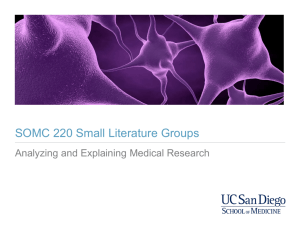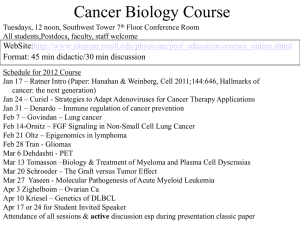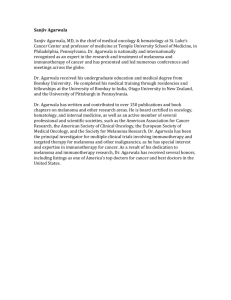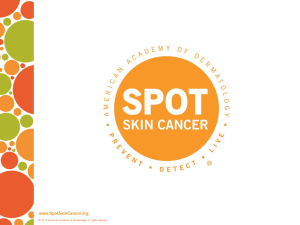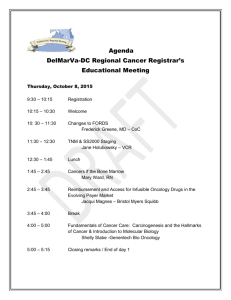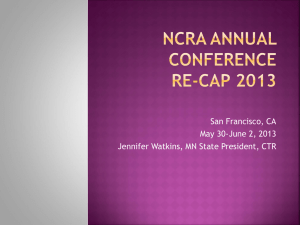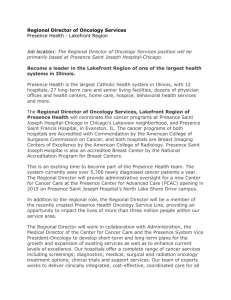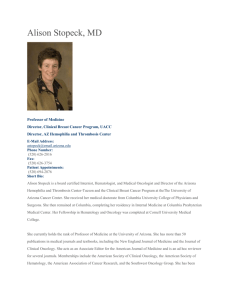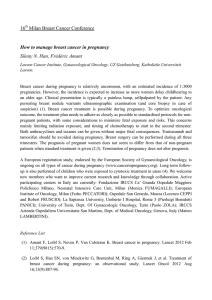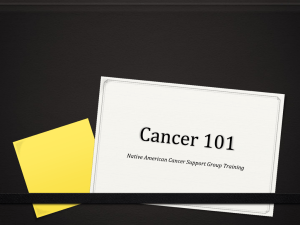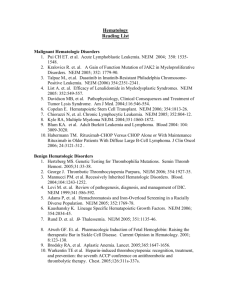Class Schedule - NYU School of Medicine
advertisement
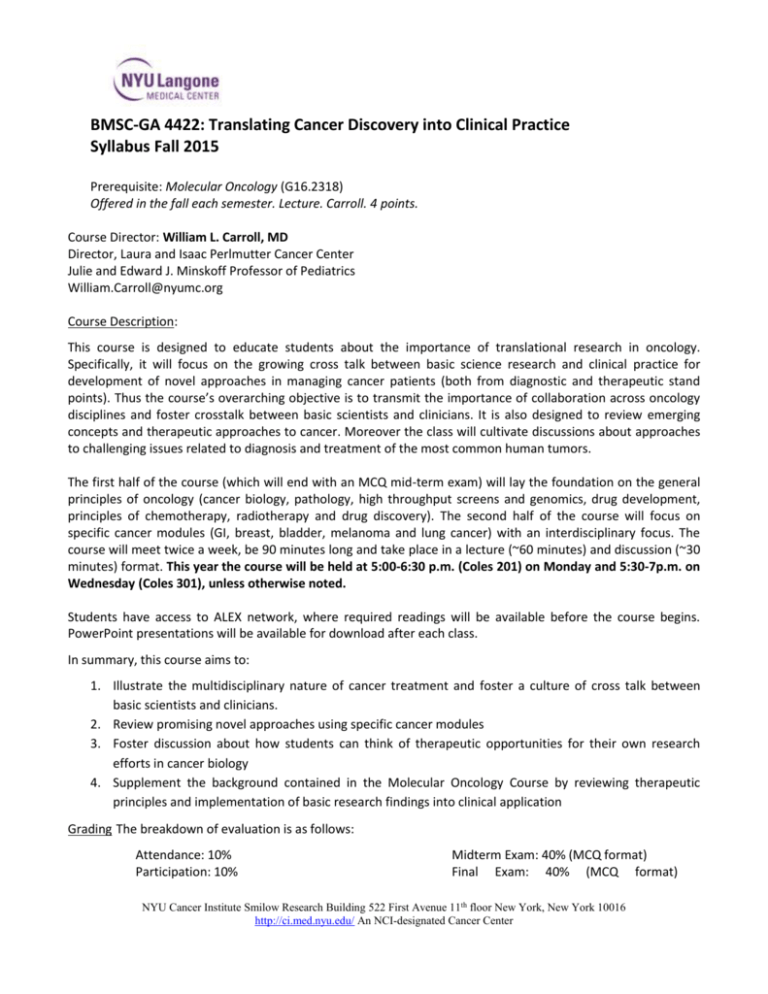
BMSC-GA 4422: Translating Cancer Discovery into Clinical Practice Syllabus Fall 2015 Prerequisite: Molecular Oncology (G16.2318) Offered in the fall each semester. Lecture. Carroll. 4 points. Course Director: William L. Carroll, MD Director, Laura and Isaac Perlmutter Cancer Center Julie and Edward J. Minskoff Professor of Pediatrics William.Carroll@nyumc.org Course Description: This course is designed to educate students about the importance of translational research in oncology. Specifically, it will focus on the growing cross talk between basic science research and clinical practice for development of novel approaches in managing cancer patients (both from diagnostic and therapeutic stand points). Thus the course’s overarching objective is to transmit the importance of collaboration across oncology disciplines and foster crosstalk between basic scientists and clinicians. It is also designed to review emerging concepts and therapeutic approaches to cancer. Moreover the class will cultivate discussions about approaches to challenging issues related to diagnosis and treatment of the most common human tumors. The first half of the course (which will end with an MCQ mid-term exam) will lay the foundation on the general principles of oncology (cancer biology, pathology, high throughput screens and genomics, drug development, principles of chemotherapy, radiotherapy and drug discovery). The second half of the course will focus on specific cancer modules (GI, breast, bladder, melanoma and lung cancer) with an interdisciplinary focus. The course will meet twice a week, be 90 minutes long and take place in a lecture (~60 minutes) and discussion (~30 minutes) format. This year the course will be held at 5:00-6:30 p.m. (Coles 201) on Monday and 5:30-7p.m. on Wednesday (Coles 301), unless otherwise noted. Students have access to ALEX network, where required readings will be available before the course begins. PowerPoint presentations will be available for download after each class. In summary, this course aims to: 1. Illustrate the multidisciplinary nature of cancer treatment and foster a culture of cross talk between basic scientists and clinicians. 2. Review promising novel approaches using specific cancer modules 3. Foster discussion about how students can think of therapeutic opportunities for their own research efforts in cancer biology 4. Supplement the background contained in the Molecular Oncology Course by reviewing therapeutic principles and implementation of basic research findings into clinical application Grading The breakdown of evaluation is as follows: Attendance: 10% Participation: 10% Midterm Exam: 40% (MCQ format) Final Exam: 40% (MCQ format) NYU Cancer Institute Smilow Research Building 522 First Avenue 11th floor New York, New York 10016 http://ci.med.nyu.edu/ An NCI-designated Cancer Center Class Schedule Date/Time/ Location Instructor(s) William Carroll, MD Recommended Readings Lecture Theme and Guiding Topics General Principles Module a. Introduction – The Nature of Cancer Baljit Singh, MD General Principles of Clinical Cancer Biology – Pathology a. How are cancers diagnosed and staged? b. How do newer imaging modalities establish invasiveness, metastatic spread and response to therapy? c. What are routine diagnostic tests done by pathologists to establish cell/tissue of origin and grade? What is the purpose of a “frozen section”? d. What happens when the pathologist can’t determine the primary origin of a particular tumor (a case of the “unknown primary”)? William Carroll, MD Russell Berman, MD Aristotelis Tsirigos, PhD Peter B. Schiff, MD, PhD Principles of Chemotherapy a. How does chemotherapy really work? b. What are the mechanisms that tumor cells use in vivo to escape treatment? c. Can tumors be screened ex vivo to determine susceptibility to selected agents? Surgical Principles a. When is a biopsy performed vs. a resection? b. How do surgeons plan tumor removal before and during an operation? c. What is the value of “robotic” surgery? Introduction to Genomics a. Principles and applications of sequencing b. Processing of sequencing data c. Interpretation of genomics data Principles of Radiation Biology a. How does radiation therapy work? b. How does one choose the radiation therapy approach to fit the particular tumor? c. What are the new radiation treatments approaches The Emperor of All Maladies S. Mukherjee 2010 Kumar, Pathologic Basis of Disease 2014 Sorlie, T, et al. Proc Natl Acad Sci U S A 2001 Paik, S, et al. NEJM 2004 Hammond et al, JCO 2011 Wolf, A, et al. JCO 2013 Widemann, B and P Adamson. Cancer in Children and Adolescents 2010 Gerber, DE and JD Minna. Cancer Cell 2010 Jamal-Hanjani et al Clin Ca. Res 2015 Bonenkamp, JJ, et al. NEJM 1999 Balch, CM, et al. Ann Surg Oncol 1994 Ntziachristos, P, et al. Nature 2014 Camphausen, KA and LR Coia. Cancer Management 2009 Podgorsak, EB. “Basic Radiobiology” including proton beam? Mace Rothenberg, MD (Pfizer) Grant Williams, MD (Williams Cancer Drug Consulting) Adriana Heguy PhD Cyrus Hedvat, MD, PhD How New Drug Discovery Really Works, Part I a. How do pharmaceutical companies think about drug development? b. What are the common mistakes early in the process that prevent a drug from making it further in the pipeline? How New Drug Discovery Really Works, Part II a. What are the steps in developing new drugs from discovery, pre-clinical development and validation and clinical evaluation? b. What are the regulatory guidelines for FDA approval? Integration of Genomic Testing in Translation Research, Part I a. Brief Overview and History of DNA Sequencing b. The Genome c. The Epigenome d. The Transcriptome Integration of Genomic Testing in Clinical Care, Part II a. What is precision medicine/oncology? b. How are genomic discoveries translated into diagnostics? c. A guide to interpreting clinical genomic reports 2006 Durante, M and JS Loeffler. Nat Rev Clin Oncol 2010 Ma, Y, et al. Semin Immunol 2010 Forment, SC and S Demaria. J Natl Cancer Inst. 2013 Kwak, et al. NEJM 2010 Soda, et al. PNAS 2008 Goff, LW, et al. Invest New Drugs 2010 Ou, et al. The Oncologist 2012 US Dept of HHS, “Guidance for Industry” documents Trimarchi, T, et al. Cell 2014 Singh, et al. J Mol Diag 2013 Thomas et al. Curr Opin Oncol 2014 Midterm Elliot Newman, MD Pancreatic & Colon Cancer Module: Landmark Clinical Trials in GI Oncology a. Studies of major randomized clinical trials in GI Oncology that have shaped modern therapeutics in gastro-esophageal, colorectal, and pancreatic cancer Lombardi, L, et al. Cancer Treat Rev 2010 Hurwitz, H, et al. N Engl J Med 2004 Lawrence Leichman, MD Lawrence Leichman, MD Targeted Therapy in GI oncology: a. Current paradigms and future directions b. Current advances in targeted agents for gastrointestinal cancers and prospects for personalized oncologic care c. Integrated GI Oncology: Science and art of combining therapeutic modalities for optimal outcomes in GI cancers using the paradigm of metastatic colorectal cancer Targeted Therapies in GI Oncology (continued) Francisco Esteva MD Breast Cancer Module: Diagnosis, Epidemiology a. Risk factors and epidemiology of Breast Cancer b. Screening and Diagnosis including that for high risk women c. Molecular subtypes/gene expression profiles of breast cancer Francisco Esteva, MD Sylvia Adams, MD Breast Cancer Module: Treatment d. Endocrine therapy e. HER2-directed therapy f. Molecular targets in triple negative breast cancer g. Mechanisms of drug resistance Breast Cancer Module: Immunotherapy David Polsky, MD, PhD Eva Hernando, PhD Hurwitz, H, et al. NEJM 2004 Douillard, JY, et al. NEJM 2013 Bar-Sagi senior author; Cancer Cell 2014 Melanoma Module: Melanoma Incidence Is Rising Faster Than Other Tumors a. A model to study the dilemma of genes and environmental interaction Melanoma Module: Targeted therapy in melanoma a. Targeting BRAF in Melanoma b. Targeting-kit in melanoma c. Uveal melanoma Cancer Facts & Figures 2014. ACS Wolff AC, Hammond ME et al. APLMO 2013 Perou, CM, et al. Nature 2000 TCGAN. Nature 2012 Giordano, S. JCO 2014 Esteva, FJ. Nat Rev Clin Oncol 2009 Baselga, J. NEJM 2012 Foulkes. NEJM 2010 Adams, S, et al. JCO 2014 Thomas, D. Nat Rev Genet 2010 Torres, SM, et al. Pigment Cell Melanoma Research. 2013 Kabbarah, O, et al. PLoS One 2010 Flaherty, KT and G McArthur. Cancer 2010 Nina Bhardwaj, MD, PhD Melanoma Module: Immunotherapy a. Role of immunotherapy in melanoma treatment James Suh, MD Lung Cancer Module: Pathology Perspectives a. Morphologic and Molecular classification of Adenocarcinoma b. Implementation of Lung cancer Biomarker Testing in Clinical Practice James Tsay, MD Lung Cancer Module: Early Detection a. CT Screening and Metabolic Imaging for the early detection of Lung cancer b. Biomarkers for the Early Detection/Classification of Lung Cancer Abraham Chachoua, MD Lung Cancer Module: Implications for Therapy Mutations, FISH, and IHC: Use for Prediction of Biologic and Cytotoxic Therapy Xue-Ru Wu, MD Bladder Cancer Module: Pre-clinical a. What sets bladder cancer apart from other cancers? b. Modeling bladder cancer using genetically engineered mouse models c. Latest Developments d. Clinical Implications Arjun Balar, MD Bladder Cancer Module: Treatment a. Epidemiology, risk factors, staging b. Standard Treatment of Localized disease Chen, DS and Mellman, I. Immu nity. 2013 Naidoo, J, et al. BJC 2014 Yoshizawa, A, et al. Mod Pathol 2011 Travis, WD, et al. J Thorac Oncol 2011 The Cancer Genome Atlas Research Network. Nature 2014 Aberle, DR, et al. J Natl Cancer Inst 2010 Henschke, CI, et al. NEJM 2006 Ostroff, RM, et al. PLoS One 2010 Ocak, S, et al. Eur Respir J 2009 The National Lung Screen Trial Research Team NEJM 2011 McShane, LM, et al. Nature 2005 Mok, TS, et al. NEJM 2009 John, T, et al. Oncogene 2009 Wu, XR. Nat Rev Cancer 2005 Wu, XR. Cancer Metastasis Rev 2009 Cancer Genome Atlas Research Network, Nature 2014 Grossman, B, et al. NEJM 2003 Von der Maase, H, et c. Standard Treatment of Metastatic disease d. Experimental therapy and future directions a. Genomic profiling of bladder cancer b. VEGF(R) directed therapies, single agent and combinations c. Other molecularly targeted agents d. Immunotherapy (anti-PD L1) Wednesday 12/10/14 5:30pm MSB 588 Monday 12/15/14, 5:30pm MSB 588 NO CLASS SCHEDULED Final Exam al. JCO 2000 Iyer, G, et al. JCO 2013
